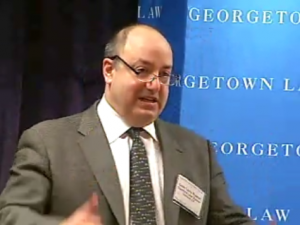The Daniel Webster Congressional Clerkship Initiative
On April 5, 2011 Stanford Law School and Georgetown University Law Center co-led an academic conference at Georgetown to spur the creation of a legislative law clerk program in Congress.

The conference, Legislative Clerkships and their Implications for Legal Education, Politics, and Law, featured an opening keynote by Rep. Zoe Lofgren (D-CA) and a closing keynote by Rep. Dan Lungren (R-CA), who together championed bipartisan bill (H.R. 6475) during the 110th Congress that would establish two-year clerkship positions for 12 highly qualified law school graduates to serve an equal number of members in both the House and the Senate. That bill, additionally co-sponsored by Rep. Gabrielle Giffords (D-AZ) and Rep. Lynn Woolsey (D-Calif), passed in September 2008 by voice vote. Sen. Charles E. Schumer (D-NY) and his co-sponsor (then) Sen. Hillary Clinton (D-NY) introduced a Senate version of the House bill (S. 3533), but it did not reach the Senate floor.
During the 111th Congress, H.R. 151 was introduced in the House and S. 27 in the Senate. Again the bill passed in the House but stalled in the Senate. Efforts are underway again in the 112th Congress.
Stanford Law School Dean Larry Kramer first envisioned the idea in 2005 of creating a congressional internship program modeled after the federal judicial clerkship program, which provides new law school graduates with an invaluable insider’s understanding of the judicial decision-making process, because there was nothing similar for educating young lawyers in the legislative process. In 2005, the deans of 145 law schools, led by Larry Kramer, wrote to Congress urging creation of a congressional clerkship program. Kramer spent the ensuing years rallying support from within the legal profession, including from law school deans across the country.
“Part of the reason the legal profession in this country tends to emphasize litigation and the judiciary over legislation and the lawmaking process is because legal education has traditionally been tilted toward the courts,” Kramer has explained. “What’s more, the top law graduates in the nation go on to begin their careers as judicial clerks. Those former clerks then go on disproportionately to assume leadership positions in the bar and in the profession. At a time when this nation faces momentous challenges, it is vital to engage the most gifted of our future leaders in the legislative process at the outset of their careers. To have leaders of the profession whose first, formative experience was in Congress would do much to improve understanding and appreciation of the legislative process.”
The proposed clerkships are being named for Daniel Webster, the great American Senator who was also one of the nation’s greatest lawyers and orators.
To learn more about the effort to establish the Daniel Webster Congressional Clerkship program in Congress:
- Visit the Congressional Clerkship Initiative website
- Watch video segments of the conference (formatted in QuickTime)
